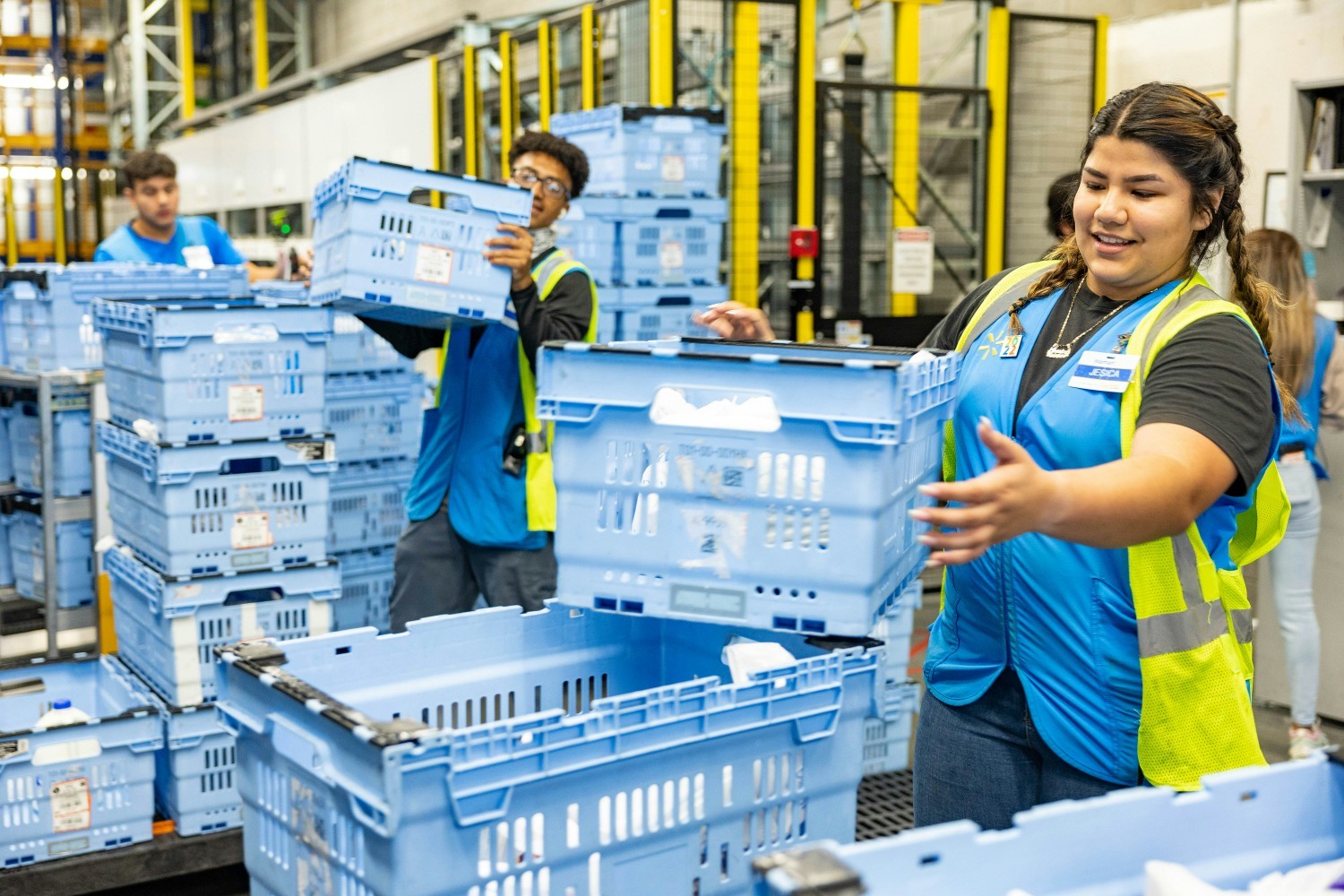Developing, Employee Experience
The retail giant has been investing in its employees, with more workers reporting a positive experience.
Walmart has made the Fortune 100 Best Companies to Work For® List this year, an achievement that caps a remarkable journey to transform its employee experience.
No. 1 on the Fortune 500, Walmart is a financial juggernaut. What started as a regional discount chain in Arkansas has become the largest company in the world by revenue.
At the heart of its success are the 2.1 million associates around the world (1.6 million in the U.S.) who enable the company to live its purpose: “Live better.”
“Good jobs, opportunity, and ensuring associates feel a sense of belonging are key drivers of our long-term success,” says Donna Morris, chief people officer at Walmart. “We strive to make Walmart a place where everyone knows they are listened to, valued, engaged, and supported.”
With a company of Walmart’s size and scale, creating a consistently great experience for every employee is no small task. “There is no one-size-fits-all employee experience, especially in today’s workforce that is diverse and multigenerational,” Morris says.
Walmart’s leaders started to realize the full magnitude of the impact their organization could have in 2005, when Lee Scott, former president and CEO of Walmart, delivered a speech called “Twenty-First Century Leadership.” Hurricane Katrina had just devastated Louisiana and coastal areas in the Southern U.S. In responding to the crisis, Scott and Walmart saw an opportunity to have an impact beyond running an exemplary retail business.
“Good jobs, opportunity, and ensuring associates feel a sense of belonging are key drivers of our long-term success.” - Donna Morris, chief people officer, Walmart
“What would it take for Walmart to be that company, at our best, all the time?” Scott asked. “What if we used our size and resources to make this country and this Earth an even better place for all of us: customers, associates, our children, and generations unborn? What would that mean?”
Walmart set out to answer that question — and Scott’s speech laid out commitments to increase diversity, reevaluate supply chains, and commit to raising wages over time. The result: The number of employees who said Walmart is a great place to work went up nearly 60% between 2017 and 2023.
Raising wages increases well-being
Walmart has made headlines with its wage hikes in recent years.
“Investing in wages, benefits, and learning that support all forms of well-being — physical, emotional, and financial — is key to helping our associates live healthier lives, develop fulfilling careers, and ultimately strengthen their impact on all those they serve,” Morris says.
Wages were raised again in 2024, with the average frontline employee making $18 an hour, and store managers receiving between $90,000 to $170,000 a year, up from a base salary of $65,000. Walmart also offers financial tools like a 401(k) and an associate stock purchase program, and training tools through the digital app called Me@Walmart.
These investments in wages and financial tools have been deeply meaningful to Walmart workers, with the number of hourly workers reporting fair pay in 2023 going up 61% from 2017 to 2023 in its Trust Index™ Survey. The number of hourly employees who said they receive a fair share of company profits went up 70%.
“There is a very positive supportive culture here at Walmart. The pay is above par, and excellence is recognized,” shared one employee in their survey.
How Walmart made the 100 Best
Companies make the Fortune 100 Best list based on the employee feedback collected in confidential surveys. Employees report their experience on 60 statements that measure trust — the key ingredient in high-performing cultures where employees thrive.
Companies only make the list by having competitive results, and Walmart is no exception. The retailer’s survey scores are even more impressive when you consider its size. For a company with over 1 million employees, offering a consistently positive experience for a global workforce is a dazzling achievement.
Despite its size, Walmart employees report having a more consistently positive experience than the typical U.S. workplace in retail. At Walmart, 72% of employees said they had a great workplace compared to just 57% of employees who said the same at a typical U.S. retail company.
“I would not get these opportunities if I worked for many other companies.” - Walmart employee
One example: Walmart employees are more likely than a typical U.S. retail employee to report receiving training and development support. At a typical retail company, only half (53%) of employees feel they receive training and development to further their careers. At Walmart, more than two-thirds report having development and training support.

Walmart’s leaders closely measure the employee experience. “We track internal engagement, growth and job satisfaction metrics, [and] retention, and regularly report on our progress in creating a more diverse and inclusive workplace,” Morris says.
Here are some of the things Walmart does to create a winning workplace culture:
1. Tearing the “paper ceiling”
Unnecessary credentials or education requirements can be detrimental for equity of opportunity for employees.
“We’ve always been focused on eliminating unnecessary barriers for associates to advance in their careers,” says Morris. “For example, 75% of salaried managers in U.S. stores, clubs, and supply chain facilities started in hourly roles with us and we’ve never required degrees to hold these roles, which earn $113,000 on average.”
Walmart has also removed degree requirements for the majority of office jobs to support career advancement opportunities for all employees.
“The opportunities I have been provided for promotion without a college degree are unmatched,” said one employee. “I would not get these opportunities if I worked for many other companies.”
The retailer also carefully tracks who gets promoted from frontline roles into management. In its 2023 Culture, Diversity, Equity & Inclusion Report, Walmart reported that, 44% of promotions from hourly worker into management were women and 43% were people of color.
2. Opportunities to grow a career
Walmart invests in training frontline associates and managers with its Walmart Academy, its Associate to Driver program, and additional educational resources. These investments translate into an impressive amount of internal mobility for employees, with 88% of U.S. roles above entry-level being filled internally in the 2023 fiscal year.
The Associate to Driver program offers an example of how Walmart offers unique opportunities to associates. The 12-week program allows associates working in stores, fulfillment centers, and transportation offices to earn their commercial driver’s license, and become drivers, making up to $110,000 in their first year.
“Associates are increasingly viewing continuous learning as a key part of their career — often fueled by technological change,” Morris says. “As a result, we’re equipping associates with skills training that allows them to gain the skills needed to advance even faster.”
More than 2,000 store and club managers per year attend Walmart’s Manager Academy, and the chain’s Global Walmart Academy is available to all associates, offering a mix of virtual and in-person training.
3. Making a community impact
Nearly eight in 10 Walmart employees feel good about the way the company contributes to their community. Because of its size and reach, the retailer often plays a vital role in delivering services to rural communities.
As one example, Walmart has 4,000 stores operating in areas designated as underserved by the federal Health Resources and Service Administration. To support these communities, Walmart is expanding services, as well as training associates to become pharmacy technicians, opticians, and medical assistants.
These efforts have led to nearly three in four Walmart employees reporting that their work has special meaning, a crucial driver of employee retention.
“Technology is also enabling us to give associates visibility into the impact of their work,” Morris says. “We share data with associates about how their area of the store is performing so they can see where they’re doing well, where they can improve, and how they compare to their peers.”
The result? Employees take more ownership over their work, and the value they provide in their community. Today, Walmart associates are proud of their organization, and much more likely to recommend their workplace to friends and family.
Join the movement
Hear from leaders at companies that made the Fortune 100 Best Companies to Work For list at our For All™ Summit, May 7-9 in New Orleans.













